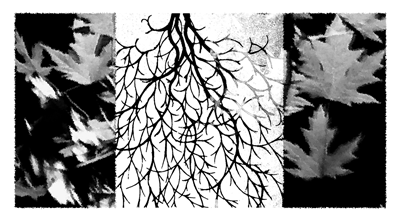
Tzigane
Black history conference
Blackness in Canada will be the focus for academic, arts and community leaders when McGill hosts Ebony Roots: Northern Soil, to kick off Black History Month. The conference marks the first time that many of the participants will meet face to face.
"We know each other's work but we've never had the opportunity to dialogue publicly," says Professor Charmaine Nelson, the conference's organizer. "That's really sad."
Nelson had been wanting to address that gap for a long time. She articulated the idea at a meeting of her department, Art History and Communications, last April and "then I had to do it."
Working with a handful of graduate and undergraduate students, Nelson has spent the last nine months taking a crash course in conference planning and fundraising. Since she only arrived at McGill in 2003, she's had to learn the university infrastructure, as well.
The decision to bring a variety of leaders from across North America to focus on Canadian race perspectives proved complex. Nelson remained uncompromising in her "ambitious" mandate. "A lot of people wanted this to be about Quebec, or about Montreal," says Nelson. "But many accomplished contributors to Black and African Studies are outside of this city, and I wanted to include them."
Nelson says Canada lacks the infrastructure of multiple programs in Black Studies, such as in the U.S. Events like Ebony Roots: Northern Soil are far more common there -- which made it doubly important for Nelson to open the dialogue here.
Instead of the usual panels of prepared papers, Ebony Roots: Northern Soil will be much more dynamic. "Only academics could appreciate someone reading non-fiction aloud," she laughs. Panels -- organized around themes like visual culture, institutional racism and concepts of nation -- will be entirely unscripted. "We really don't know what anyone is going to say."
Instead, each panelist will be encouraged to participate dialogues through personal research and experience. Nelson "hand-picked" the panelists. Her initial intention was to ensure representation of men and women, different races and someone from outside of Canada, to address each theme. Although availabilities made that formula difficult to maintain, the results are impressive. The popular culture panel will bring together dub poet Clifton Joseph, MusiquePlus VJ Malik Shaheed and Concordia University's Monika Kin Gagnon. "In the end, people were emailing me and saying 'I want to come,'" says Nelson.
Nelson underlines that it's the first time such a wide array of black scholars will be under McGill's roof, making the conference a unique opportunity. The exclusive invitations to panelists are balanced by an open invitation to academics and non-academics alike to attend the conference, which is free. "It's a benefit to the public; we want everyone to come."
Thus, financing became a priority. The challenge was to find sponsors for a Black History Month event in an already underfunded field like the humanities. Various departments offered what they could. In addition, Solidarity for Palestinian Human Rights covered printing costs and ViaRail helped cover some transportation costs.
Posters feature a logo designed by McGill student Hahn Soe-Lin, who impressed the jury in a city-wide competition that attracted entries from both university and CEGEP students. All entries will be displayed alongside other materials in a show at the Redpath Library during the conference.
The event's title plays on the connection to roots reggae and its resonance for black culture. Being rooted, like a tree, is also an important metaphor. "They said black people wouldn't stand the cold," says Nelson, "but we're still here. We belong here."
Ebony Roots: Northern Soil will take place February 4 and 5 in Room S 1-4 of the Stewart Biology Building. For more information, call 398-6750 or go to www.arts.mcgill.ca/programs/ahcs/html/BlackHistoryConference.html.
